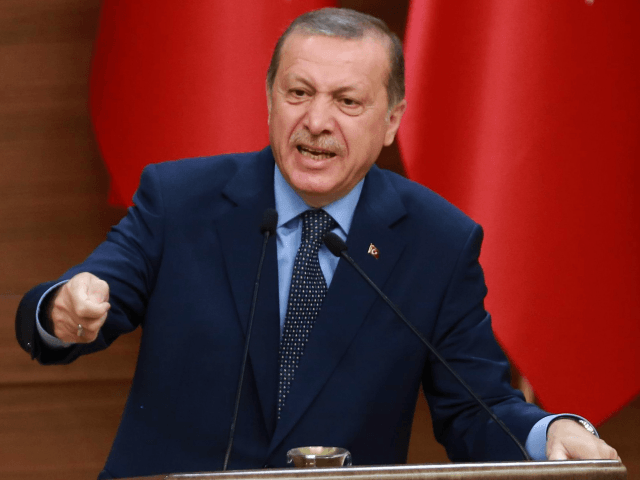Turkish President Recep Tayyip Erdogan has made clear he wants Turkey to play a significant role in the liberation of Mosul, Iraq, from the Islamic State (ISIS). The Iraqi government has rejected Turkey’s advances, however, and while Erdogan waits for an opportunity to participate in that offensive, he has begun discussing similar military activity against ISIS “capital,” Raqqa, Syria.
During a speech Tuesday, Erdogan asserted that Turkey had a “goal” of forming “a 5,000-square-kilometer terror-free zone” surrounding Raqqa. Erdogan identifies not just the Islamic State as a terrorist group, but the Syrian Kurdish Peoples’ Protection Units (YPG), as well. “Manbij will be cleansed of PYD [Democratic Union Party] elements,” Erdogan asserted, referring to a neighboring region and the political party that organizes the YPG. “We have no tolerance on this issue and we expressed our position to our partners in the coalition.”
Erdogan deployed troops to Iraq for the purpose of keeping the Syrian Kurdish militia from traveling too far west towards Turkey, in a mission dubbed “Operation Euphrates Shield.” Iraq sternly condemned the deployment, calling it a violation of national sovereignty.
While Turkish officials have affirmed they will play a role in the ultimate liberation of Raqqa, they have insisted that they will not do so if the U.S. and other coalition parties insist on the YPG also being part of that coalition.
During his remarks Tuesday, Erdogan chided Iraqi Prime Minister Haider al-Abadi for calling for Turkey to withdraw its troops from Iraq. “Before messing with Turkey, go deal with Daesh [Islamic State], the PKK,” he warned. To America, he said, “We are partners in NATO. Iraq is not in NATO. When you asked for help in Afghanistan, we came to your aid in the fight against terror, not Iraq. Why do you partner with them and terrorist groups this time?”
The Kurdistan Workers’ Party (PKK) is a Kurdish Marxist terrorist group. The United States has identified the PKK as a Foreign Terrorist Organization, but not the YPG or PYD, and has cooperated with the latter militia against the Islamic State in Syria.
This is not the first time Erdogan hints at his potential participation in Raqqa. “Obama particularly wants to do something together [with us] about Raqqa,” Erdogan said in September, returning from the G-20 Summit. “We have told him that this is not a problem for us. … We said, ‘Let our soldiers come together, whatever is necessary will be done.’”
Erdogan has also repeatedly stated that Turkey will participate in the battle for Mosul, which began on Monday. Turkish Prime Minister Binali Yıldırım has confirmed that Turkish fighter jets are on call to engage in airstrikes against ISIS when necessary, clarifying a previous rumor that the Turkish jets were already in action.
Erdogan has argued that Turkish intervention is necessary in Mosul because of the participation of Shiite militias, which have previously been accused of ethnic cleansing of Sunnis in villages where they have eradicated the Islamic State. Shiite leaders have thus been the most vocal opponents of Turkey’s presence in Iraq. Baghdad’s government is Shiite-run, and it is enjoying the support of controversial Shiite cleric Muqtada al-Sadr, who has called for protests in front of Turkey’s embassy in the Iraqi capital.
It is difficult to see how the government of Syria will welcome Turkey any more warmly than the government of Iraq. Erdogan has repeatedly referred to dictator Bashar al-Assad as a “terrorist” and called for him to step down. In recent months, however, Erdogan has softened his tone, suggesting Turkey would be comfortable with Assad remaining in power for the duration of the fight against the Islamic State. This pivot arrives as Erdogan struggles to mend ties with Russia, Assad’s most powerful ally.

COMMENTS
Please let us know if you're having issues with commenting.